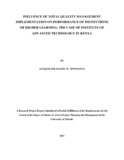| dc.description.abstract | Total Quality Management (TQM) is a comprehensive and structured approach to organizational
management that seeks to improve the quality of products and services through ongoing
refinements in response to continuous feedback. Although TQM originated in the manufacturing
sector, its principles can be applied to almost every type of organization. This study aimed at
assessing the influence of Total Quality Management Implementation on performance of
Institutions of Higher Learning, a case of the Institute of Advanced Technology. More
specifically it aimed at examining how leadership, customer satisfaction, employee involvement
and student involvement influence performance at the Institute of Advanced Technology. The
study adopted a descriptive survey design. The target population of the study was 1350 which
comprised students and staff of four IAT branches. A sample size of 270 respondents was used
which is 20% of the target population, this is higher than 10% of accessible population as
recommended by Mugenda and Mugenda (1999). Stratified random sampling method was used
to achieve the desired representation from the various sub-groups. Pilot testing of the data
collection instrument was performed by administering the questionnaires to 10% of the sample
size. To establish the validity of the research instrument content validity was used; to check
reliability of the instrument, Cronbach’s alpha methodology based on internal consistency of the
research instrument was used. An alpha value of 0.849 was obtained, thus the research
instrument used was confirmed to be reliable. After data collection, the questionnaires were
cleaned, coded, organized and analyzed. Descriptive statistics and Correlation, using Karl
Pearson’s Product Moment Coefficient were used to analyse the data and establish the
relationship between the dependent variables and the set of independent variables using SPSS
software. The study found out that the rate of importance attached to customers by employees
and managers had a mean of 9.00 which is close to very important from the Likert scale and had
a very small standard deviation of 0.202 which indicates that employees and managers place a
high value on customers during their service delivery. The rate on employee involvement in the
implementation of TQM has a mean of 7.89 and a small standard deviation of 1.453 from the
Likert scale which indicates that majority of the respondents were in agreement that they get
involved in TQM implementation to a greater extent. Student involvement in the implementation
of TQM at the Institute has a mean of 7.44 which is full implementation on the Likert scale and
has a small standard deviation of 1.29 which indicates that majority of the respondents indicated
that students are active team players in the implementation of TQM at the institute of Advanced
Technology. Organizations need to therefore ensure that their staff and relevant stakeholders
know the mission, vision and values of those organizations since this has a bearing on the quality
and performance. The study concluded that there needs to be an integrated system that ensures
communication between the management, lecturers, other employees and the general student
fraternity to help in reducing disputes and improving performance. Future studies could evaluate
the influence of TQM implementation in corporate institutions like the banks, insurance
companies and other service sector organizations.
3
CHAPTER ONE: INTRODUCTION
1.1 Background of the Study
This study was concerned with establishing the influence of TQM implementation on
performance of IAT. The study was carried out at four branches of IAT in Nairobi. This chapter
gives background information of the Institute of Advanced Technology (IAT), when it was
started and how it has experienced tremendous growth over the years. It also gives a brief
description of the challenges it has been facing in regards to competition and insights of steps
that can be taken to ensure they stay ahead of the competition.
Quality authorities have put forth several approaches to improve company performance. These
approaches are embodied in a set of quality management practices, known as Total Quality
Management (TQM). On account of these policies, different approaches have been adopted for
the introduction of quality management in institutions of higher learning. These approaches
include; self-assessment, external assessment of the institutions, accreditation and certification
systems. Quality Management (QM) presents a strategic option and an integrated management
philosophy for organizations, which allows them to reach their objectives effectively and
efficiently, and to achieve sustainable competitive advantage (Goldberg and Cole, 2002).
Several studies on influence of quality on performance of institutions of higher learning have
been carried out. Maingi (2012) found out that there is a positive relationship between quality
assurance and academic performance and there is a significant positive relationship between
quality assurance and customer satisfaction. The study concluded that there needs to be an
integrated system that ensures communication between the management, lecturers, other
employees and the general student fraternity to help in reducing disputes and improving
performance.
A similar | en_US |

